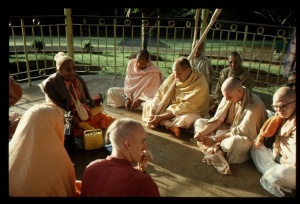CC Antya 7.33 (1975): Difference between revisions
(Vanibot #0027: CCMirror - Mirror CC's 1996 edition to form a basis for 1975) |
(Vanibot #0020: VersionCompareLinker - added a link to the Version Compare feature) |
||
| Line 2: | Line 2: | ||
<div style="float:left">'''[[Sri Caitanya-caritamrta (1975)|Śrī Caitanya-caritāmṛta (1975)]] - [[CC Antya (1975)|Antya-līlā]] - [[CC Antya 7 (1975)|Chapter 7: The Meeting of Śrī Caitanya Mahāprabhu and Vallabha Bhaṭṭa]]'''</div> | <div style="float:left">'''[[Sri Caitanya-caritamrta (1975)|Śrī Caitanya-caritāmṛta (1975)]] - [[CC Antya (1975)|Antya-līlā]] - [[CC Antya 7 (1975)|Chapter 7: The Meeting of Śrī Caitanya Mahāprabhu and Vallabha Bhaṭṭa]]'''</div> | ||
<div style="float:right">[[File:Go-previous.png|link=CC Antya 7.32 (1975)|Antya-līlā 7.32]] '''[[CC Antya 7.32 (1975)|Antya-līlā 7.32]] - [[CC Antya 7.34 (1975)|Antya-līlā 7.34]]''' [[File:Go-next.png|link=CC Antya 7.34 (1975)|Antya-līlā 7.34]]</div> | <div style="float:right">[[File:Go-previous.png|link=CC Antya 7.32 (1975)|Antya-līlā 7.32]] '''[[CC Antya 7.32 (1975)|Antya-līlā 7.32]] - [[CC Antya 7.34 (1975)|Antya-līlā 7.34]]''' [[File:Go-next.png|link=CC Antya 7.34 (1975)|Antya-līlā 7.34]]</div> | ||
{{CompareVersions|CC|Antya 7.33|CC 1975|CC 1996}} | |||
{{RandomImage}} | {{RandomImage}} | ||
==== TEXT 33 ==== | ==== TEXT 33 ==== | ||
| Line 20: | Line 19: | ||
<div class="synonyms"> | <div class="synonyms"> | ||
trayyā—by followers of the three Vedas who perform great sacrifices like | trayyā—by followers of the three Vedas who perform great sacrifices like Indra and other demigods; ca—also; upaniṣadbhiḥ—by the followers of the Upaniṣads, the topmost portion of Vedic knowledge; ca—also; sāṅkhya—by the philosophers who analytically study the universe; yogaiḥ—by mystic yogīs; ca—and; sātvataiḥ—by devotees who follow the method of worship mentioned in the Pañcarātra and other Vedic literatures; upagīyamāna—being sung; māhātmyam—whose glories; harim—unto the Supreme Personality of Godhead; sā—she, mother Yaśodā; amanyata—considered; ātma-jam—her own son, born out of her body. | ||
</div> | </div> | ||
| Line 27: | Line 26: | ||
<div class="translation"> | <div class="translation"> | ||
"When mother Yaśodā saw all the universes within the mouth of Kṛṣṇa, she was certainly astonished for the time being. Nevertheless, she still considered the Lord her own son, although He is worshiped by great personalities who offer him sacrifices, great saints who understand the greatness of the Lord by studying the Upaniṣads, great philosophers who analytically study the universe, great yogīs who know him as the all-pervading Supersoul, and even devotees who accept the Lord as the Supreme Personality of Godhead.' | |||
</div> | </div> | ||
| Line 34: | Line 33: | ||
<div class="purport"> | <div class="purport"> | ||
This verse is from Śrīmad-Bhāgavatam ([[SB 10.8.45]]). | This verse is from Śrīmad-Bhāgavatam ([[SB 10.8.45|10.8.45]]). | ||
</div> | </div> | ||
Latest revision as of 03:57, 27 January 2020

A.C. Bhaktivedanta Swami Prabhupada
TEXT 33
- trayyā copaniṣadbhiś ca
- sāṅkhya-yogaiś ca sātvataiḥ
- upagīyamāna-māhātmyaṁ
- hariṁ sāmanyatātmajam
SYNONYMS
trayyā—by followers of the three Vedas who perform great sacrifices like Indra and other demigods; ca—also; upaniṣadbhiḥ—by the followers of the Upaniṣads, the topmost portion of Vedic knowledge; ca—also; sāṅkhya—by the philosophers who analytically study the universe; yogaiḥ—by mystic yogīs; ca—and; sātvataiḥ—by devotees who follow the method of worship mentioned in the Pañcarātra and other Vedic literatures; upagīyamāna—being sung; māhātmyam—whose glories; harim—unto the Supreme Personality of Godhead; sā—she, mother Yaśodā; amanyata—considered; ātma-jam—her own son, born out of her body.
TRANSLATION
"When mother Yaśodā saw all the universes within the mouth of Kṛṣṇa, she was certainly astonished for the time being. Nevertheless, she still considered the Lord her own son, although He is worshiped by great personalities who offer him sacrifices, great saints who understand the greatness of the Lord by studying the Upaniṣads, great philosophers who analytically study the universe, great yogīs who know him as the all-pervading Supersoul, and even devotees who accept the Lord as the Supreme Personality of Godhead.'
PURPORT
This verse is from Śrīmad-Bhāgavatam (10.8.45).